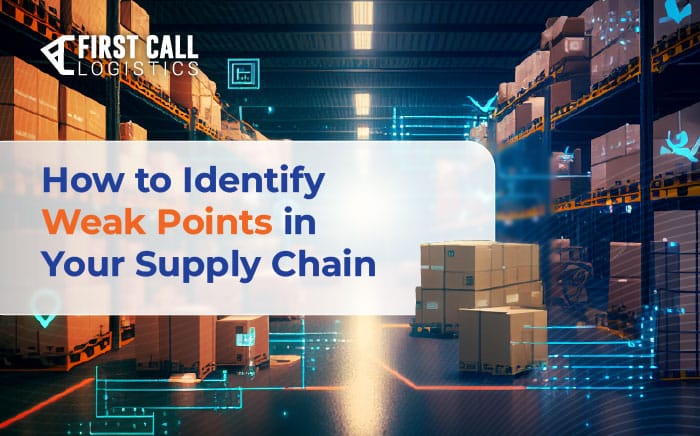How to Identify Weak Points in Your Supply Chain

A well-optimized supply chain can elevate virtually any business, but too often an organization’s established logistics processes become outdated as markets and industries evolve. Even the most resilient supply chains can give way to sudden weak points over time when left unattended.
GEP, a leading global provider of logistics and procurement services, estimates between 6-10% of a company’s annual revenue is lost to supply chain disruption — a figure totaling up to $4 trillion in lost revenue. Such a staggering impact on the collective bottom line highlights the importance of proactively addressing potential supply chain weaknesses.
Here are three key questions to consider when identifying potential vulnerabilities that exist between your organization and its customers:
1. Does My Business Track Product Movement at Every Level?
If you want optimal results from your supply chain processes (and really, who doesn’t?) the solution begins with real-time supply chain tracking. This degree of visibility encompasses two equally vital components: shipment tracking and proactive communication. Together, they play a pivotal role in enhancing your logistics arm.
Strong supply chains can easily track freight movement from sourcing and production to warehouse storage and final delivery. Visibility also helps anticipate bottlenecks and closely evaluate your current delivery processes for ways to improve efficiency.
Visibility relies on more than an advanced TMS (although that certainly plays a role) — a clear line of communication among carriers, shippers and at times even individual customers is the foundation of supply chain resiliency. Each link in the supply chain must be able to effectively communicate with the others, else they risk lengthy delays and other costly errors as shipments move between different parties.
Take an honest look at your current supply chain and seek areas lacking visibility or gaps in communication. If your current tracking capabilities aren’t up to par, upgrading software or partnering with a 3PL can provide your business with an uninterrupted view from start to finish.
2. Are My Shipping Operations Diversified?
Resilient supply chains practice carrier diversification, utilizing multiple shipping modes, lanes and partners to move freight rather than limiting their own shipping networks to one rigid shipping plan.
Flexibility through diverse shipping operations means no single mechanical failure or unfortunate weather event (or global pandemic) can fully sidetrack your ability to deliver freight to customers.
Not only does exploring shipping alternatives make your entire supply chain less susceptible to disruption — it also expands your network, potentially introducing you to partners who specialize in certain loads or regions at better rates. You’ll have more carriers to choose from, and you’ll be better positioned to move larger shipments as your business grows.
If your supply chain relies heavily on any one method of transportation, now is the time to start exploring alternatives in preparation for future challenges.
3. Are My Deliveries Arriving On Time and Undamaged?
By definition, successful supply chains are those that consistently deliver goods safely and on time. Processing returns and replacements for damaged goods hurts profits and diminishes your reputation with customers — if your deliveries regularly arrive late or damaged, it’s likely time to seek new carriers with a better track record.
For a shipper, the best means of ensuring reliable on-time delivery is to cultivate relationships with a variety of trusted carriers, take advantage of shipment tracking (see above) and maintain open communication with your main point of contact as the shipment progresses. The closer your working relationship, the easier it will be for a carrier to keep you informed — and to hold themselves accountable if things don’t go as planned.
Overcoming Weak Points with 3PLs
With established networks of suppliers, pre-integrated technology solutions and a wealth of industry expertise, reputable 3PLs like First Call can help identify and address vulnerabilities within your supply chain to improve efficiency, reduce costs and boost customer satisfaction.
Contact us today and discover how our 3PL services can build you a stronger, more efficient supply chain that drives success for your business.
Simplify your Next Shipment with First Call Logistics
Building and managing cost-efficient supply chains is a full-time job. First Call’s rare combination of in-house assets, expert problem-solving and track record of stellar customer service makes us the 3PL of choice for business partners with a wide range of shipping needs.
More Logistics Resources:
Get the latest supply chain news and updates directly to your inbox.